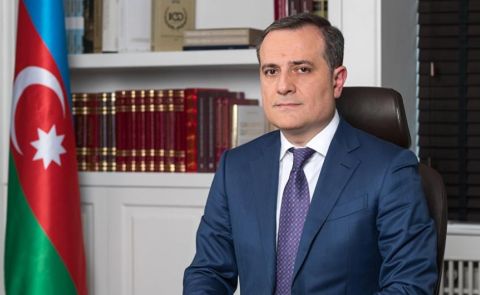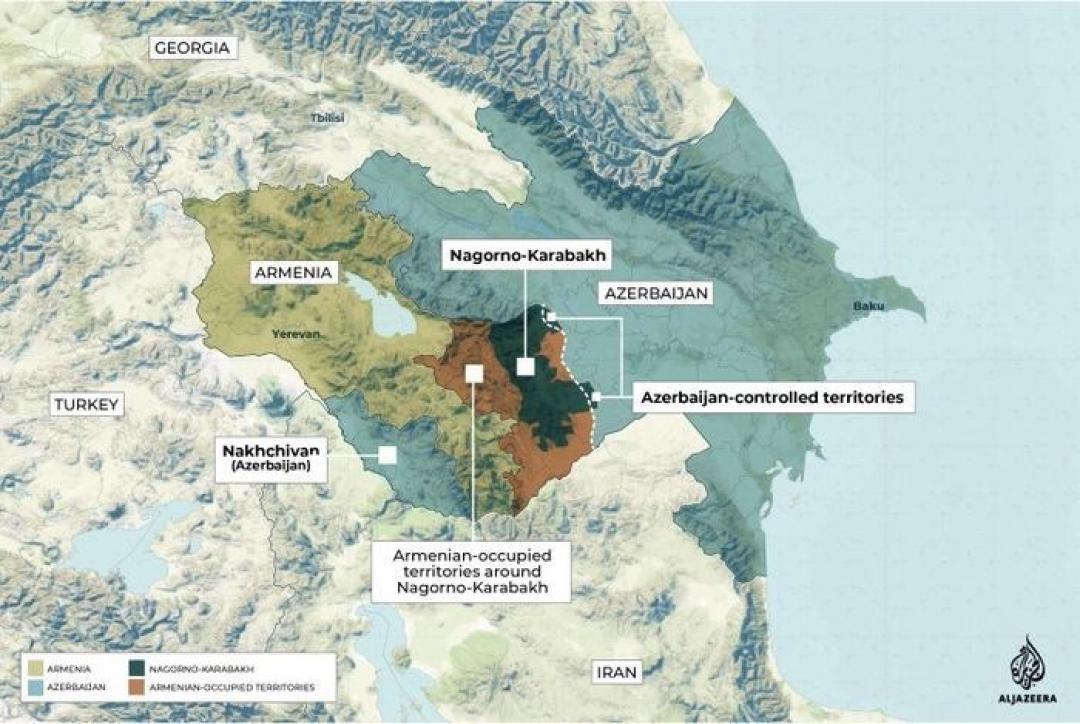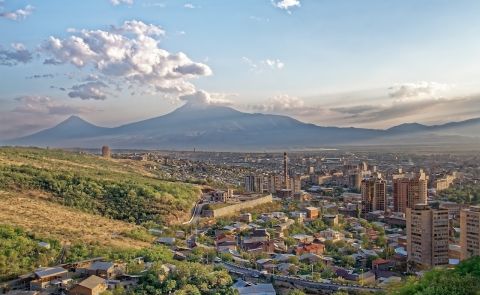
Nagorno-Karabakh war: developments from 3 through 5 October

Military developments
On 5 October, the spokesperson of Armenia’s Ministry of Defence (MOD) Shushan Stepanyan stated that battles of varying intensity continue in the Karabakh conflict zone. “At the moment, Azerbaijan is delivering missile strikes to Stepanakert with great intensity. Azerbaijan resumed offensive operations in the southern direction of the Karabakh front … The units of the Defence Army are making a worthy response to the enemy forces,” she said. Stepanyan also added that Armenia was also arming journalists who are going to the conflict region.
It was also reported that the de facto Nagorno-Karabakh Defence Army has pulled back troops in some sections of the frontline for strategic purposes. The press secretary for Nagorno-Karabakh’s de facto President Vahram Poghosyan stated in a Facebook post that the Armenian forces have “the legal right to transfer operations to the entire territory of Azerbaijan in order to clear it of terrorist groups.”
In a public address, Armenia's Prime Minister Nikol Pashinyan called on conscripts demobilised within the last year to voluntarily sign up for military service, since according to Armenian legislation they are not subject to general mobilisation.
The Armenian MOD confirmed that a total of 228 military personnel have been killed in the ongoing fighting. As of yet, Azerbaijan has not released any information on the number of deaths among their soldiers. The office of the de facto Nagorno-Karabakh human rights defender reported that 19 civilians, 80 injured and more than 2700 items of property and infrastructure were damaged during the conflict.
Meanwhile, Azerbaijan’s MOD reported that the radar systems of the Azerbaijani air defence forces recorded the launch of a rocket fired at Azerbaijan from positions in the Jermuk, Gafan and Berd regions of Armenia. In addition it was reported that a missile was sent towards Mingachevir, an industrial city in Azerbaijan. Mingachevir contains a water reservoir and a key electricity plant. The MOD also reported that an artillery attack was launched on Ganja, the second largest city in Azerbaijan, where one local resident was killed, and four others were injured. Two 300-km medium-range missiles were also fired at Khizi and Absheron regions. The city of Agjabedi was also under artillery fire, where several local residents were injured as a result of the shelling.
The Azerbaijani army also had taken the Shikhali Agali, Sarijali, Mazra villages of Jabrayil region and several strategic heights in different directions. It must be noted that during the course of the weekend the Azerbaijani army had also taken the city of Jabrayil and the villages of Karkhulu, Shukurbayli, Yukhari Maralyan, Chereken, Dashkasan, Horovlu, Mahmudlu, Jafarabad and Decal in Nagorno-Karabakh. The Prosecutor General’s Office of Azerbaijan stated that from 27 September to this day, 24 civilians have been killed and 121 people have been injured in total.
Political developments
In an interview to the German newspaper Bild, Armenia’s Prime Minister Nikol Pashinyan said that “Nagorno-Karabakh and Armenia have become the front of civilization”. “Armenians in the South Caucasus are the last obstacle to Turkey’s expansion to the north, southeast and east […] Turkey’s actions are aimed at restoring the Turkish empire. If the world community […] fails to properly understand the geopolitical significance of what is happening, Europe will have to expect Turkey near Vienna soon,” he emphasized. In response to a question whether the Russian army would help Armenia, Pashinyan said that the Russian 102nd military base is stationed in the country and that if specific cases arise within the auspices of the joint Armenian-Russian air defence system agreement, that Russia would fulfil its treaty obligations.
In another interview with Al Jazeera, Pashinyan was asked whether he would like to see Russian peacekeepers for example in Nagorno-Karabakh. “You see, these issues could be discussed as part of a wider resolution within the OSCE Minsk Group,” he answered. Earlier, Pashinyan told Russian journalists that Armenia is not considering the possibility of introducing international peacekeepers into the conflict zone and does not intend to contact the CSTO. The spokesperson of Russia’s President Dmitry Peskov said that the sending of Russian peacekeepers would only be possible under consent from both Armenia and Azerbaijan.
In an interview with TRT Haber TV channel, Azerbaijan’s President Ilham Aliyev spoke about the possible conditions that could help bring about a ceasefire. “We [Azerbaijan] have demands. We must have very serious guarantees. International mediators must confirm these guarantees to us. At the same time, we must be given a schedule for Armenia's withdrawal from the occupied territories, the dates on which it will leave each district. Of course, then the war will stop, because we want this issue to be resolved peacefully, but it must be resolved,” he stated.
Aliyev also spoke on his relationship with Pashinyan since he came to power in Armenia, while addressing the nation a day earlier. “Pashinyan told me that the situation inside was difficult, that he was being squeezed here and there, and asked for some time to solve this problem because he had some new ideas. He said he had drawn a line through everything that happened in the past, asked for a chance, for some time. I said OK. But what happened then? A year later, he said that “Karabakh is Armenia.” Let him say that “Karabakh is Armenia” now. The calls I have been receiving and the conversations I have been having during the calls are, of course, confidential, and in some cases, they are asking me what our condition is. My condition is the same – to leave our lands, to leave them, to stop the confrontation. Not in word but in deed. Let him say that he recognizes the territorial integrity of Azerbaijan, as stated in the fundamental principles. Let him say that he will withdraw his troops from the occupied territories, as stated in the fundamental principles. Let him say that he apologises to the Azerbaijani people and say that Karabakh is not Armenia,” he said.
International statements
The OSCE Minsk Group Co-chairs issued a statement in regard to the ongoing hostilities in Nagorno-Karabakh. “We strongly condemn the continued violence in the Nagorno-Karabakh conflict zone as well as against targets in the territory of Armenia and Azerbaijan away from the Line of Contact and express our alarm at reports of increasing civilian casualties. Targeting or threatening civilians is never acceptable under any circumstances. The Co-Chairs call on the sides to observe fully their international obligations to protect civilian populations,” the statement emphasized. The Co-Chairs also stressed that external parties’ participation in the escalating violence undermines efforts to achieve lasting peace in the region. They also urgently called for an immediate humanitarian ceasefire to enable the repatriation of remains of fallen servicemen in coordination with the OSCE and the International Committee of the Red Cross (ICRC).
The ICRC “also strongly condemned the reported indiscriminate shelling and other alleged unlawful attacks using explosive weaponry in cities, towns and other populated areas, in which civilians are losing their lives and suffering terrible injuries, including life-changing ones.”
The scheduled meeting in Yerevan of the Prime Ministers of the Eurasian Economic Union (EAEU) will take place despite the ongoing hostilities. Flight Radar24, a website tracking international flights, reported earlier in the day that a special Russian plane catering to high-ranking government and security officials landed in the Armenian capital.
See Also


Nordic-Baltic Delegation Meets Armenian Leaders to Discuss Regional Cooperation and Peace

Azerbaijan Strengthens Energy Partnerships with Multiple Countries

BP Strengthens Presence in Azerbaijan’s Offshore Energy Sector

Netanyahu’s Letter to Aliyev: Mutual Trust, Solidarity Following Hamas Attacks, Facilitating Dialogue Between Israel and Türkiye

